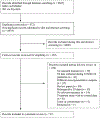A narrative systematic review of changes in mental health symptoms from before to during the COVID-19 pandemic
- PMID: 37615061
- PMCID: PMC11706599
- DOI: 10.1017/S0033291723002295
A narrative systematic review of changes in mental health symptoms from before to during the COVID-19 pandemic
Abstract
The onset of the COVID-19 pandemic raised concerns regarding population-wide impacts on mental health. Existing work on the psychological impacts of disaster has identified the potential for multiple response trajectories, with resilience as likely as the development of chronic psychopathology. Early reviews of mental health during the pandemic suggested elevated prevalence rates of multiple forms of psychopathology, but were limited by largely cross-sectional approaches. We conducted a systematic review of studies that prospectively assessed pre- to peri-pandemic changes in symptoms of psychopathology to investigate potential mental health changes associated with the onset of the pandemic (PROSPERO #CRD42021255042). A total of 97 studies were included, covering symptom clusters including obsessive-compulsive disorder (OCD), post-traumatic stress disorder (PTSD), fear, anxiety, depression, and general distress. Changes in psychopathology symptoms varied by symptom dimension and sample characteristics. OCD, anxiety, depression, and general distress symptoms tended to increase from pre- to peri-pandemic. An increase in fear was limited to medically vulnerable participants, and findings for PTSD were mixed. Pre-existing mental health diagnoses unexpectedly were not associated with symptom exacerbation, except in the case of OCD. Young people generally showed the most marked symptom increases, although this pattern was reversed in some samples. Women in middle adulthood in particular demonstrated a considerable increase in anxiety and depression. We conclude that mental health responding during the pandemic varied as a function of both symptom cluster and sample characteristics. Variability in responding should therefore be a key consideration guiding future research and intervention.
Keywords: COVID-19 pandemic; anxiety; depression; psychopathology; systematic review.
Figures



References
-
- Adams RE, Zheng S, Taylor JL, & Bishop SL (2021). Ten weeks in: COVID-19-related distress in adults with autism spectrum disorder. Autism: The International Journal of Research and Practice, 25(7), 2140–2145. - PubMed
-
- Alonso P, Bertolín S, Segalàs J, Tubío M, Real E, Mar-Barrutia L, … Menchón JM (2021). How is COVID-19 affecting patients with obsessive-compulsive disorder? A longitudinal study on the initial phase of the pandemic in a Spanish cohort. European Psychiatry: The Journal of the Association of European Psychiatrists, 64(1), 1–27. - PMC - PubMed
Publication types
MeSH terms
Grants and funding
LinkOut - more resources
Full Text Sources
Medical

